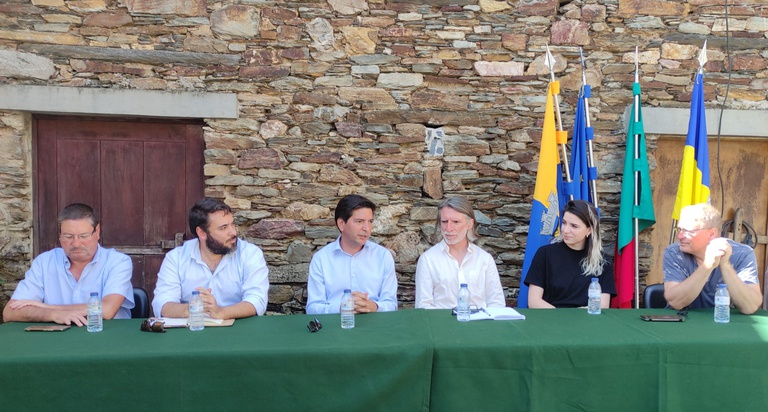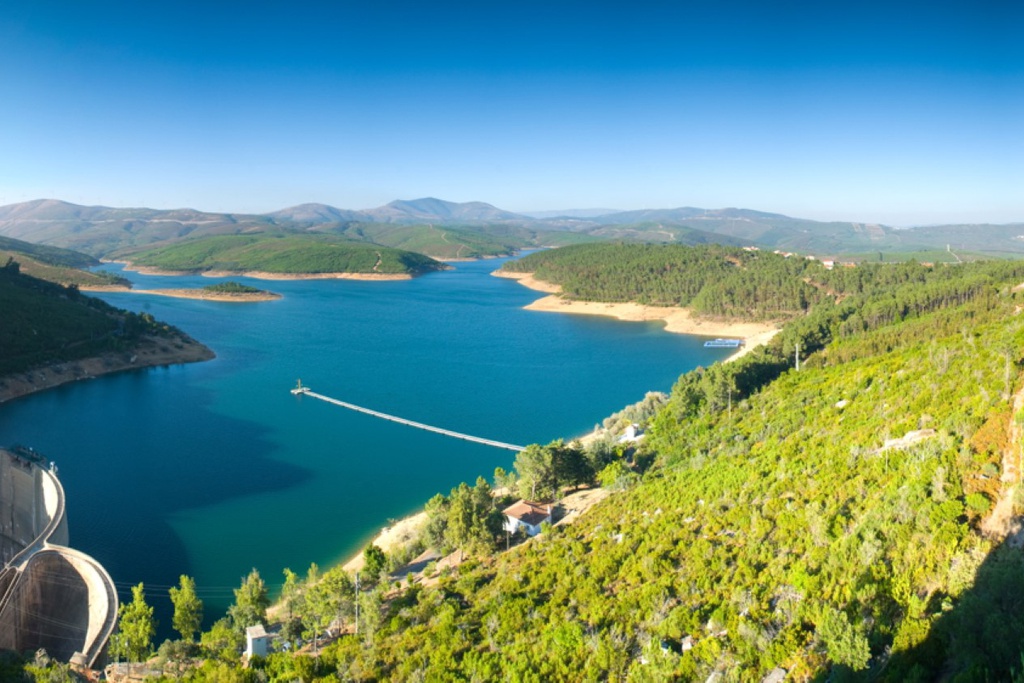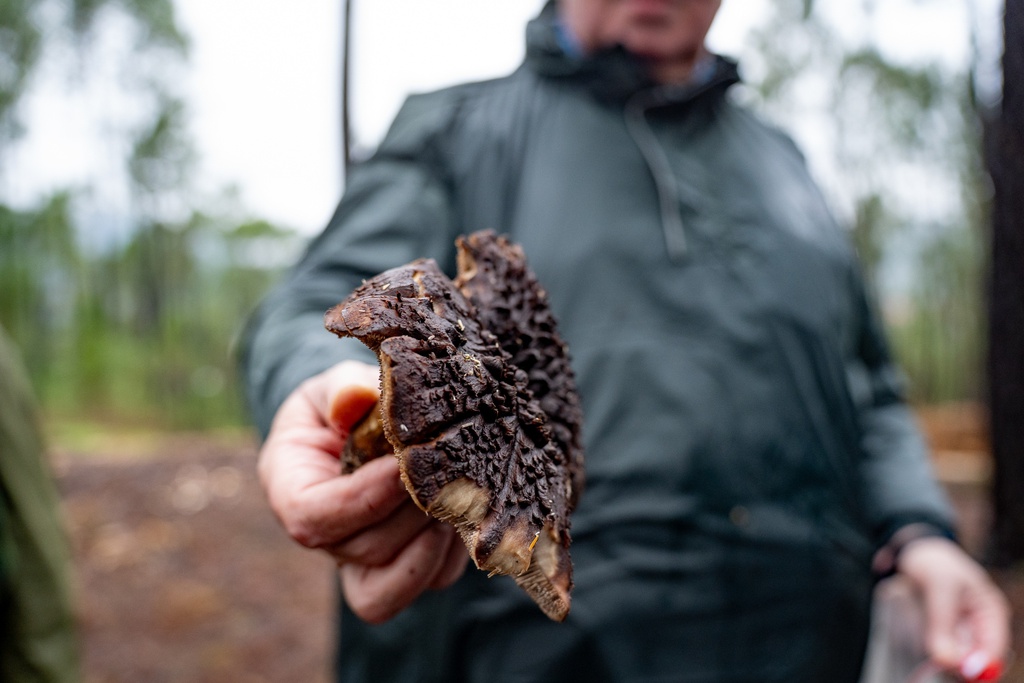The artistic residency “Astronomia”, taking place in Aldeias do Xisto (Schist Villages) and in the Estrela UNESCO Global Geopark, from July 17th to 29th, is the first event to take place in Portugal within the scope of the project “Inhabit and move in mountain territories”, candidate by PES – Projeto Entre Serras, to the Creative Europe program.
Over two weeks, Serbian-Dutch artist Katarina Petrović travels to Portugal to explore the relationship between sky and earth, art and science, landscape and natural phenomena. In recent years, her research has focused on phenomena such as the Airy Disk. “If we dedicate ourselves to a singke discipline, just to art or just to science, knowledge is incomplete”, considers Katarina Petrovic. This is the reason why, in her work, she seeks to reconcile “various areas and establish link between them”, such as, for example, between art and science. In addition to Airy’s Disc, Katarina is also curious to develop work on the so-called “green light”. As she explains, this is a phenomenon that occurs at sunset, when, for a few seconds, a green circle forms. At the presentation conference, the artist was enthusiastic about the project and the possibility of continuing the research that she has been developing in recent years.
According to Bruno Ramos, coordinator of ADXTUR – Agency for the Tourist Development of Aldeias do Xisto, there are several factors that justify this artistic residency in this territory. “This attitude of experimentation and artistic and scientific welcome is part of the Aldeias do Xisto matrix. We have known for a long time that this immersion is necessary to find new products, new goods and new development paths”, he says. The theme to be explored in this project, “Inhabit and moving in mountain territories”, also meets this immersion logic. “A different rhythm is needed to understand what the landscape is and what the territory is. With mechanization, we started to have a utilitarian vision of the landscape and we defend that it is necessary to be, stay and walk towards a different vision”, he adds. The fact that Aldeias do Xisto are certified as a Starlight Tourist Destination and the development of projects in that context that involve art, science and pedagogy is yet another argument in favor of this initiative.
“Here there is a very peculiar telluric atmosphere”, underlines Rui Simão, councilor of Pampilhosa da Serra City Council. “Bringing scientific knowledge to our processes of searching for new paths, but also the sensitivity of artists is a way of transforming knowledge into social phenomena”, he considers. Rui Simão also underlines that by bringing together “art, science and local experiences, we show new worlds to those who are here and open doors to others who seek their world”.
Carlos Casteleira, from PES, also believes that “the artistic dimension in science is essential”, even considering that “without the question of sensitivity, so associated with art, science is not viable”. It is thus an “inescapable relationship for knowledge”.
“As a UNESCO territory, Estrela Geopark is a territory of education, science and culture” and, therefore, its performance “goes far beyond the enhancement of rocks”, explains Lucas César, from Estrela Geopark. By joining this project, it thus assumes the mission of “valuing biodiversity and the populations that occupied the territory and that used the rock as a resource and also the sky as a territory”.
A symbiotic experience with places
This initiative corresponds to the first two phases of a proposal by CAIRN Art Centre, one of the project's partners, and which foresees three moments of work.
In a first part, which takes place from July 17th to 23rd, the artist settles in Aldeia do Xisto de Fajão, in the municipality of Pampilhosa da Serra, one of the best places in the world to observe the dark sky and, therefore, certified as a Tourist Destination Starlight. Here, Katarina will explore the various dimensions of a project that goes beyond mere observation which goes beyond mere observation to become a strategic focus that reconciles tourism development, integration with the Scientific and Technological System, social and environmental sustainability, the empowerment of people and the stimulation of the economy.
Katarina is invited to learn about the projects underway in the village and visit PASO - Pampilhosa da Serra Space Observatory, a unique piece of equipment in the Northern Hemisphere that allows that allows you to monitor space debris capable of damaging satellites. The touristic dimension of the project is made known through a night canoeing experience, in the Santa Luzia Dam, which includes an astronomical observation.
From Aldeias do Xisto, the artist heads to Geopark Estrela, to explore Serra da Estrela and, in particular, the relation between Astronomy and the highest mountain in mainland Portugal, patent even in its toponymy. She also has the opportunity to access and use the Astronomical Observatory and Viewpoint of Travancinha, which recently received new equipment for use by researchers and visitors.
In this region, the artistic residency ends with a walk, scheduled for July 29, to visit the Fireflies of Rossim, a work by Erik Samakh, which consists of installing small points of light powered by solar energy, which, during the night, imitate the pulsar of the firefly, creating poetic places and providing locals and visitors with a symbiotic experience with the surroundings.
The third and final part of this residency will take place in 2024, in Digne-les-Bains, a city in the south of France with a strong presence of the philosopher and astronomer Pierre Gassendi. At the invitation of CAIRN, Katarina will join researchers at the Saint Michel Observatory, where, in 1995, the first exoplanet was discovered.
It is expected that the work developed in this artistic residency will be part of events in Castelo Branco and/or Malpartida de Cáceres.
Katarina Petrović
Katarina Petrović is a Serbian-Dutch artist creating process-based works that explore the relationship between language and natural phenomena, interlinking art, science, humanities and technology. In recent years, her research has focused on phenomena such as the Airy Disk, through which there is a diffraction of light that produces a kind of circular halo around the sun. In June this year she released a solo exhibition at the Cultural Centre of Belgrade and a side programme at the Belgrade Astronomical Observatory where she presented the newest research on this phenomenon.
Projeto Entre Serras – Creative Europe
Under the global theme “Inhabit and move in mountain territories”, the candidature presented by the Entre Serras Project (PES), which joins partners from Portugal, Spain and France, interrogates the relationship between observing and experiencing the landscape.
Having as leading entity the Museu da Paisagem/Instituto Politécnico de Lisboa, in Portugal, besides the Aldeias do Xisto, the Municipality of Castelo Branco/Fábrica da Criatividade and Estrela UNESCO Global Geopark are also partners. The French partners are the municipality of Digne-les-Bains, CAIRN, Maison Alexandra David-Neel, Musée Gassendi and the École Supérieure d'Art d'Aix-en-Provence. The Spanish partners are the Museo Vostell Malpartida and the Municipality of Malpartida de Cáceres (Centre for Livestock Pathways).

























